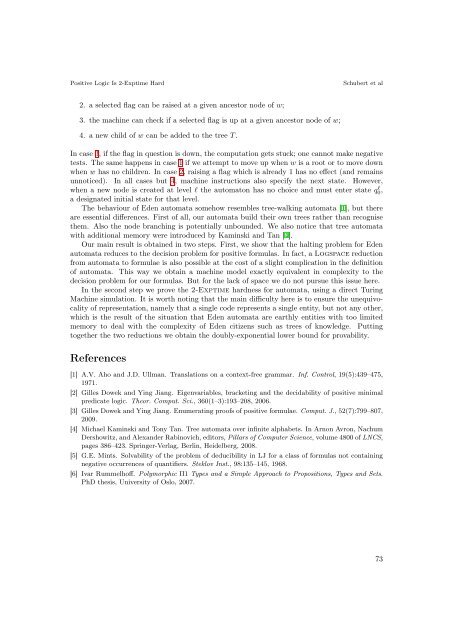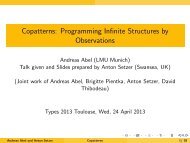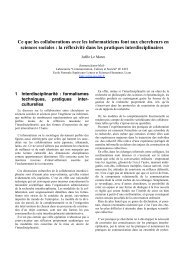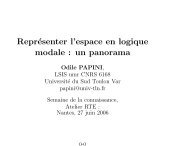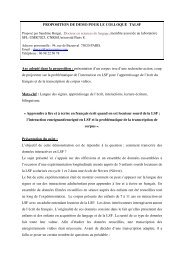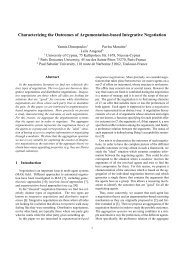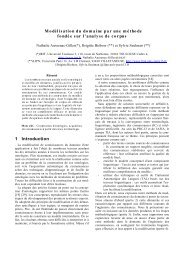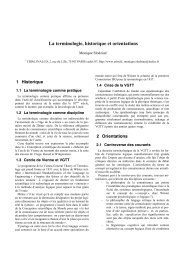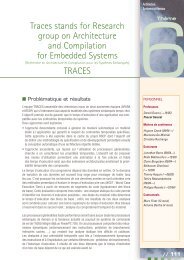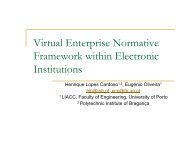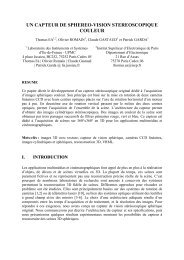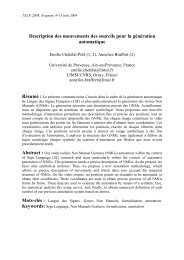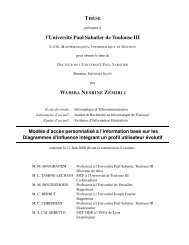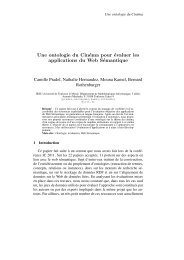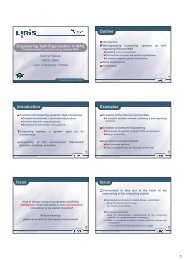Book of Abstracts - IRIT
Book of Abstracts - IRIT
Book of Abstracts - IRIT
You also want an ePaper? Increase the reach of your titles
YUMPU automatically turns print PDFs into web optimized ePapers that Google loves.
Positive Logic Is 2-Exptime Hard<br />
Schubert et al<br />
2. a selected flag can be raised at a given ancestor node <strong>of</strong> w;<br />
3. the machine can check if a selected flag is up at a given ancestor node <strong>of</strong> w;<br />
4. a new child <strong>of</strong> w can be added to the tree T .<br />
In case 3, if the flag in question is down, the computation gets stuck; one cannot make negative<br />
tests. The same happens in case 1 if we attempt to move up when w is a root or to move down<br />
when w has no children. In case 2, raising a flag which is already 1 has no effect (and remains<br />
unnoticed). In all cases but 4, machine instructions also specify the next state. However,<br />
when a new node is created at level l the automaton has no choice and must enter state q0,<br />
l<br />
a designated initial state for that level.<br />
The behaviour <strong>of</strong> Eden automata somehow resembles tree-walking automata [1], but there<br />
are essential differences. First <strong>of</strong> all, our automata build their own trees rather than recognise<br />
them. Also the node branching is potentially unbounded. We also notice that tree automata<br />
with additional memory were introduced by Kaminski and Tan [4].<br />
Our main result is obtained in two steps. First, we show that the halting problem for Eden<br />
automata reduces to the decision problem for positive formulas. In fact, a Logspace reduction<br />
from automata to formulae is also possible at the cost <strong>of</strong> a slight complication in the definition<br />
<strong>of</strong> automata. This way we obtain a machine model exactly equivalent in complexity to the<br />
decision problem for our formulas. But for the lack <strong>of</strong> space we do not pursue this issue here.<br />
In the second step we prove the 2-Exptime hardness for automata, using a direct Turing<br />
Machine simulation. It is worth noting that the main difficulty here is to ensure the unequivocality<br />
<strong>of</strong> representation, namely that a single code represents a single entity, but not any other,<br />
which is the result <strong>of</strong> the situation that Eden automata are earthly entities with too limited<br />
memory to deal with the complexity <strong>of</strong> Eden citizens such as trees <strong>of</strong> knowledge. Putting<br />
together the two reductions we obtain the doubly-exponential lower bound for provability.<br />
References<br />
[1] A.V. Aho and J.D. Ullman. Translations on a context-free grammar. Inf. Control, 19(5):439–475,<br />
1971.<br />
[2] Gilles Dowek and Ying Jiang. Eigenvariables, bracketing and the decidability <strong>of</strong> positive minimal<br />
predicate logic. Theor. Comput. Sci., 360(1–3):193–208, 2006.<br />
[3] Gilles Dowek and Ying Jiang. Enumerating pro<strong>of</strong>s <strong>of</strong> positive formulae. Comput. J., 52(7):799–807,<br />
2009.<br />
[4] Michael Kaminski and Tony Tan. Tree automata over infinite alphabets. In Arnon Avron, Nachum<br />
Dershowitz, and Alexander Rabinovich, editors, Pillars <strong>of</strong> Computer Science, volume 4800 <strong>of</strong> LNCS,<br />
pages 386–423. Springer-Verlag, Berlin, Heidelberg, 2008.<br />
[5] G.E. Mints. Solvability <strong>of</strong> the problem <strong>of</strong> deducibility in LJ for a class <strong>of</strong> formulas not containing<br />
negative occurrences <strong>of</strong> quantifiers. Steklov Inst., 98:135–145, 1968.<br />
[6] Ivar Rummelh<strong>of</strong>f. Polymorphic Π1 Types and a Simple Approach to Propositions, Types and Sets.<br />
PhD thesis, University <strong>of</strong> Oslo, 2007.<br />
73


